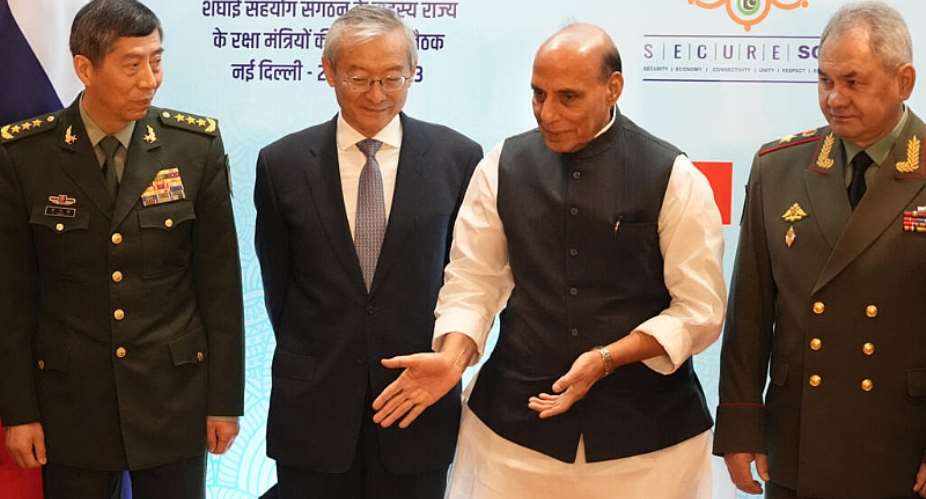Russia and India have pledged to boost defence ties despite concerns that the war in Ukraine could block deliveries from Moscow and that US sanctions might get in the way of future weapons contracts.
Indian Defence Minister Rajnath Singh and his Russian counterpart Sergei Shoigu met in Delhi on the sidelines of a Shanghai Cooperation Organisation (SCO) conference where they promised to put start-stop military trade on a steady track.
"We acknowledged the unique, long-lasting and time-tested relationship between India and Russia," the men said in a joint statement on Thursday.
Singh and Shoigu discussed Russia's backing for India's plans to rake in €3.8 billion from foreign investors into its defence production sector by 2025, officials added.
India, which holds the current G20 presidency, has refused to criticise Moscow for the war in Ukraine and instead pumped up imports of discounted Russian crude oil despite criticism from Western powers.
Russia accounts for almost half of weapons imported by India, the world's largest arms buyer despite an 11 percent decline in foreign purchases since 2013, according to Stockholm International Peace Research Institute.
Ammunition
Experts say however that the war sanctions have put a question mark on Indian orders for MiG-29 jets, M-17 helicopters and stealth frigates while Russia failed to deliver key military components to India because of the Ukrainian conflict.
Last year, India received three of the five units of S-400 air defence missile systems worth €4.5 billion but Delhi is unable to pay €1.8 billion for weapons already delivered as it fears violating secondary US sanctions, local media added.
The two allies in March unveiled a €192-million deal for jointly produced maritime cruise missiles but the future of the prestigious contract seems hazy.
Media reports also suggest Russia is reluctant to accept payment in rupees because of exchange rate volatility of the Indian currency.
In a reflection of his preoccupation with the war in Ukraine, minister Shoigu on Tuesday said the state-run Tactical Missiles Corp had been ordered to double its production.
Analysts said Russia was staring at an ammunition crunch.
"Right now, it is necessary to double the production of high-precision weapons in the shortest possible time," Shoigu said as Britain's defence ministry remarked: "logistics problems remain at the heart of Russia's struggling campaign in Ukraine".
China factor
Experts such as Kartik Bommakanti also warned that the conflict is driving Russia closer to China and is creating an unwanted headache for India, which has prickly ties with Beijing over an unresolved border dispute that took the two Asian neighbours to war in 1962.
"The increasing proximity between Moscow and Beijing will limit India's military options and fetter its capacity to credibly prosecute military operations if a war breaks out between India against Beijing," he said.
Bommakanti, a strategic analyst at Delhi-based Observer Research Foundation think tank, said in recently published comments that India must wean itself away from Russia's embrace.
India currently operates 250 Russian-built Sukhoi fighter jets, seven Kilo-class submarines and 1,200 Soviet-designed T-90 tanks. The systems would need replacement or spares in 10 to 15 year's time.
"India, today, is at a crossroads requiring some sharp choices that should enable it to break free from Moscow's stranglehold over key military supplies," Bommakant added.
But Indian Foreign Minister Subrahmanyam Jaishankar seemed upbeat as he recently said Delhi was ready to restart free trade negotiations with Russia, which previously backed India during its wars with Pakistan and China.
"Our partnership today is a subject of attention and comment, not because it has changed, but because it has not," he said before a scheduled meeting on Thursday with Russian foreign minister Sergei Lavrov.





 'Ghana beyond aid' has turned out to be 'Ghana without compass' – Naana Opoku-Ag...
'Ghana beyond aid' has turned out to be 'Ghana without compass' – Naana Opoku-Ag...
 Nation builder Mahama will deliver on his promise of a 24-hour economy for the b...
Nation builder Mahama will deliver on his promise of a 24-hour economy for the b...
 Prof Jane Naana is more than qualified to be Ghana’s first vice president and ev...
Prof Jane Naana is more than qualified to be Ghana’s first vice president and ev...
 WENDA petitions Akufo-Addo, Speaker of Parliament to make vote-buying illegal
WENDA petitions Akufo-Addo, Speaker of Parliament to make vote-buying illegal
 Supreme court declares payment of wages to spouses of President, Vice President ...
Supreme court declares payment of wages to spouses of President, Vice President ...
 Publish full KPMG report on SML-GRA contract – Bright Simons to Akufo-Addo
Publish full KPMG report on SML-GRA contract – Bright Simons to Akufo-Addo
 Kumasi International Airport to begin full operations by end of June
Kumasi International Airport to begin full operations by end of June
 Election 2024: Our ‘real challenge’ is getting ‘un-bothered’ youth to vote – Abu...
Election 2024: Our ‘real challenge’ is getting ‘un-bothered’ youth to vote – Abu...
 [Full text] Findings and recommendations by KPMG on SML-GRA contract
[Full text] Findings and recommendations by KPMG on SML-GRA contract
 Renegotiate SML contract – Akufo-Addo to GRA, Finance Ministry
Renegotiate SML contract – Akufo-Addo to GRA, Finance Ministry
